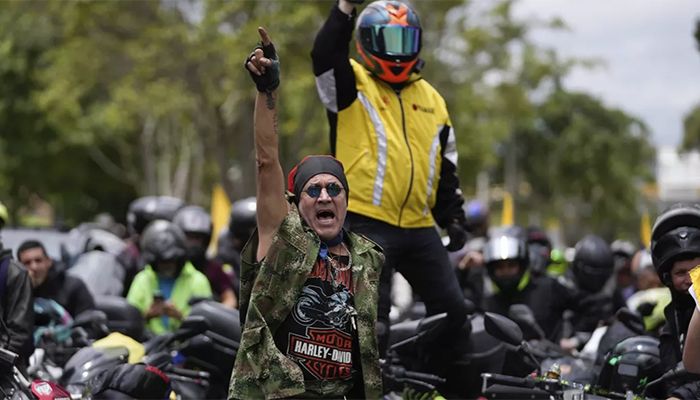
International Desk
Publish: 29 Aug 2023, 10:36 am

Photo: Collected
The cost of fuel in the South American country of Colombia has recently increased significantly, and on Monday, tens of thousands of protesters in cars and motorbikes gathered to the streets of the main towns to express their disapproval.
Protesters claim that the first socialist government of Colombia's monthly price rises are making it more difficult for small businesses to operate and could raise the price of food.
However, the administration of President Gustavo Petro claims that gasoline subsidies cost about $11 billion every year. They contend that the subsidies must be eliminated in order to pay off debts owing to Ecopetrol, the country's major gasoline producer, as well as to provide funding for social programs.
The protest comes as discontent grows with Petro's administration a year after he took office promising to reduce poverty and make peace with the nation’s remaining rebel groups.
Petro’s administration has struggled to stop violence in rural parts of the country, and to boost Colombia’s economy, which is expected to grow by just 1% in 2023, according to the International Monetary Fund.
“This government is making decisions that are anti-business,” said Alejandra Mendoza, the manager of a small company that transports frozen food and other goods for supermarkets in Colombia. She attended Monday’s protest wearing her company’s yellow jacket.
“Our costs have gone up by a third, and we have to adjust our budget each month because of the gasoline hikes” Mendoza said.
The price of gasoline in Colombia has risen from 9,000 pesos a gallon in August of last year (US $2.50) to more than 14,000 currently ($3.40) as Colombia’s government cuts back on subsidies each month.
Officials in Colombia’s Finance Ministry have said they want gasoline to reach a price of 16,000 pesos per gallon --about $4 -- by the end of the year, which would mirror current gas prices in the U.S., where the federal minimum wage, however, is more than four times greater than Colombia’s minimum wage of $280 a month.
In July, the ministry said that subsidies for diesel, which is used by most cargo trucks in Colombia. will be removed after municipal elections in October, and that the price of diesel fuel will double by the end of next year.
Petro has argued that the nation’s gasoline subsidies mostly benefited wealthier Colombians who own vehicles. But he has shown signs that he is willing to negotiate gasoline prices with some groups.
Over the weekend, Petro’s administration cut a deal with the nation’s taxi driver unions, under which gasoline prices will be frozen for the country’s estimated 200,000 yellow taxis.
However, opposition figures in Colombia argue that more needs to be done because price increases for gas are also impacting small business owners, truckers, and delivery personnel who are still working to recover from the epidemic.
Congresswoman Jennifer Pedraza, who assisted in planning Monday's demonstration, made the point that the government might curb fuel price increases by lowering the sales tax on gasoline and diesel.
She added that it was time for Colombia's national oil firm to "take an interest, in making gasoline affordable for all," saying that "the people are asking the administration to negotiate a different gasoline policy."
Subscribe Shampratik Deshkal Youtube Channel
© 2024 Shampratik Deshkal All Rights Reserved. Design & Developed By Root Soft Bangladesh